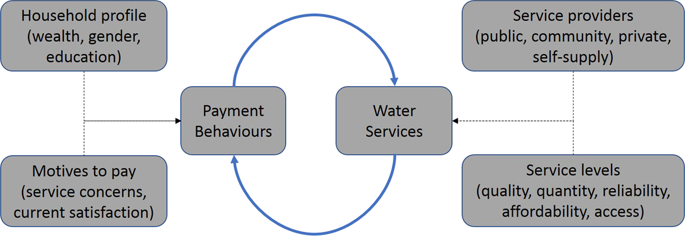npj Clean Water ( IF 10.4 ) Pub Date : 2019-11-05 , DOI: 10.1038/s41545-019-0045-y Rob Hope , Paola Ballon

|
Sub-Saharan Africa is least likely to meet the Sustainable Development Goal for safely-managed drinking water. Africa is estimated to require at least three times more annual investment, as a share of the gross regional product, than any other region to achieve ‘basic’ drinking water for everyone by 2030. If rural water users are to share some of these costs then the performance of current services needs to improve. In Africa, when a rural waterpoint fails, it takes a month or more to repair. We model water user choices across maintenance service models delivered by public, private and community providers with trade-offs in speed of repairing faults, payment levels and cash management. We find higher payments are associated with higher education and faster repair times. Household wealth, sex of respondent, seasonality, and waterpoint congestion, reliability and quality all influence payment choices. Understanding local payment choices provide behavioural clues to design more sustainable funding and service delivery models to align global and local drinking water goals.
中文翻译:

非洲农村地区的全球水政策和地方付款选择
撒哈拉以南非洲最不可能实现安全管理饮用水的可持续发展目标。据估计,到2030年,非洲每年需要的投资(占区域总产值的比重)至少是其他任何地区的三倍,以实现每个人的“基本”饮用水。如果农村用水者要分担其中一些费用,那么当前服务的性能需要提高。在非洲,当农村水位出现故障时,需要花费一个月甚至更长的时间进行维修。我们通过公共,私人和社区提供商提供的维护服务模型来模拟水用户的选择,并在修复故障的速度,付款水平和现金管理方面进行权衡。我们发现更高的付款与更高的学历和更快的维修时间相关。家庭财富,受访者性别,季节性和水位拥堵,可靠性和质量都会影响付款方式的选择。了解当地的支付选择为设计更可持续的资金和服务提供模型提供了行为线索,以使全球和当地的饮用水目标保持一致。











































 京公网安备 11010802027423号
京公网安备 11010802027423号